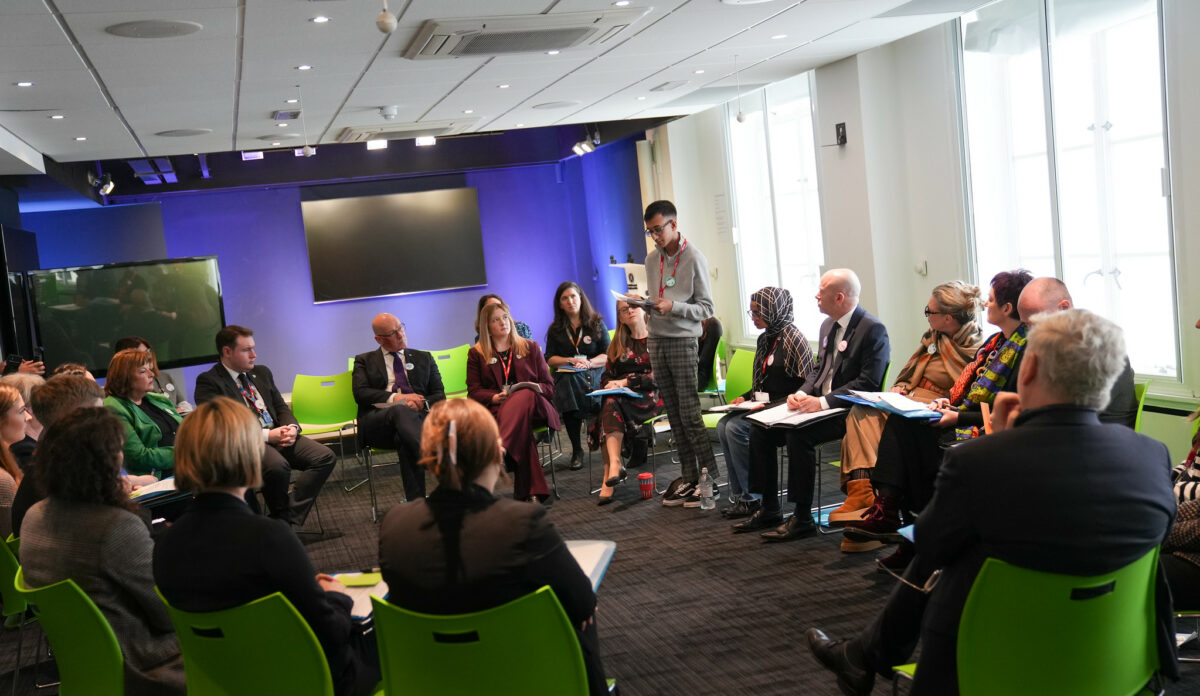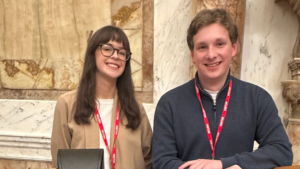In November 2025, Jamail Umar MSYP and Amna Ansar MSYP gave a speech to the First Minister and their Cabinet on increasing mental health training and education at the Annual Cabinet Meeting with Children and Young People.
Jamail and Amna called on Scottish Government to:
- Improve the training and resources provided to young people and adults working with young people, with particular focus on how this training could adopt an intersectional approach so that it represented and support marginalised communities.
- Invest in better promotion of current resources to ensure that young people are more aware of what support is available to them and where they can access it.
- Introduce universal and comprehensive mental health training for every adult who works with a young person.
You can read their speech below:
Jamail Umar
My name is Jamail Umar, I am the MSYP for Dundee City East, and I am 19 years old. Young people in Dundee repeatedly tell me that some adults “don’t care about my mental health” and that is why we’re here to talk about increasing mental health training and education.
I have a personal experience of this. When I was 16 years old, I was racially bullied and received death threats at school from one person. At the same time, I was caring for my mother, who had recently received a transplant. I received no help from my school in dealing with the situation or mental health support. All of this made my mental health deteriorate. I am extremely lucky that I had supportive friends and family around me, but I know that some young people simply don’t have that.
The point I am making is: to effectively support the mental wellbeing of young people; it is imperative that every adult who works with a young person receives comprehensive mental health training. This should be done by a continuous learning module at university. The training should adopt an intersectional lens, ensuring it equips the adults to understand and address the unique challenges faced by young people from marginalised groups, such as young carers and ethnic minorities. By making this training universal and inclusive. We can empower every young person to thrive and pursue their dreams.
We have seen meaningful progress since the last takeover. MSYPs have been invited to the Joint Strategic Board for Child and Family Mental Health’s Implementation group, contributing to awareness-raising and promotion, and an MSYP also sits on the Joint Strategic Board for Children and Families Mental Health. In addition, SYP holds regular meetings with the Scottish Government’s Children and Young People’s Mental Health team, to name just a few examples. However, despite these positive steps, more young people need to be represented on the boards that make decisions about their lives. Greater power and influence should be given to young people to ensure that policies and services genuinely meet their mental health needs.
More needs to be done because a lot of young people, I speak to only know about CAMHS and Childline, but we all know they are not the only resources young people have. Many MSYPs believe that there needs to be better signposting of mental health provision for young people, so they get help and support early, before it spirals out of control.
If we look at the data, mental health wellbeing is one of the lowest among 16 to 24 year olds in Scotland, according to the Scottish Health Survey 2024. Yet again, we see the evidence that young people have the lowest mental wellbeing, and they feel politicians are leaving them behind.
Are young people not important to politicians? I would argue that we are the future, and with our voices and ideas, we can help create a prosperous Scotland. That is why I urge you: act now to address the mental health crisis affecting young people! I want to see a Scotland that intervenes early, before a young person’s mental health spirals out of control. Our future depends on it.
Amna:
My name is Amna Safa Ansar, I am 17 years old and is the MSYP for Pentlands, Edinburgh.
Good Mental health is a necessity, not a luxury — and I’m proud to live in a country that recognizes this truth. Young people today benefit from an expanding and diverse network of mental health resources, some being very widely known such as the CAMHS and ChildLine, while others being very less known such as digital platforms like Kooth and Young Minds, etc., or even counselling services that are school-based. While these all provisions reflect a national commitment to support mental wellbeing, it is clear that not a lot of young people are still not aware of these resources and as Jamail was saying – it needs to be better signposted.
That being said, young people are not a homogenous group. A young person from a minority ethnic background may face very different challenges from an LGBTQ+ peer, a young carer, or someone growing up in rural isolation and some could even be facing all of these challenges together. We know that mental health support is most effective when it reflects individual experiences and circumstances — but how confident can we be that our current systems truly achieve this?
To ensure that mental health provision truly meets the diverse needs of young people, support systems must be designed through an intersectional lens. This means recognizing how factors such as ethnicity, gender identity, sexuality, disability, and socioeconomic background intersect to shape an individual’s mental health experiences and by making intersectionality the centre of any discussions while making decisions about mental health support. So, I am asking – what steps are you taking to ensure that while designing resources for young people, views of young people from all over Scotland is heard and considered? Also, how are you making sure that young people—especially those from marginalized backgrounds—can easily share feedback, influence service design, and access resources that reflect their diverse needs?
To end, I like to reiterate my first point, mental health is not a luxury but a necessity that every young person should have access to and Scotland’s commitment to young people means striving for a system that is not only accessible, but truly inclusive. That vision is only possible when every young voice is heard and valued.



